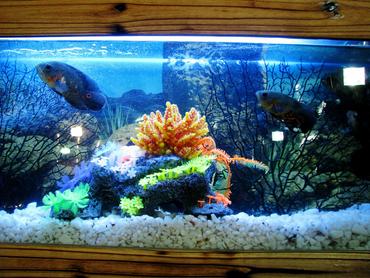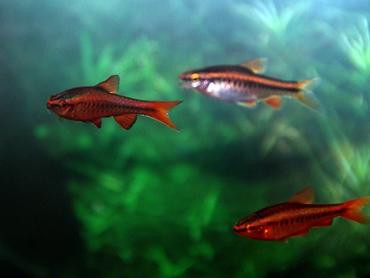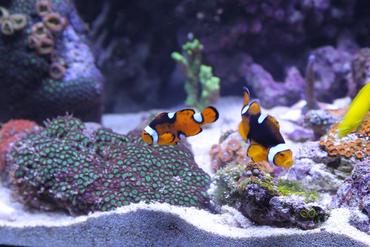AN OVERVIEW OF FISH BOWLS

This article will first give you an overview of keeping fish in a fish bowl. After that, we'll share a brief history of fish bowls and go over common sizes that you can find for fish bowls. After that we'll discuss pros and cons for keeping a fish bowl. Then we'll go over things to keep in mind with fish bowls. After that, we'll provide you with some tips on keeping fish in fish bowls. We'll finish this article with online sources for you.
Keeping Fish in Fish Bowls
Within the past century, there has been a great deal of controversy surrounding the idea of keeping fish in bowls. In 1902, G. Bateman remarked in an issue of Freshwater Aquaria that, “the common glass globe… has nothing whatever to recommend it, except perhaps to those who delight to have their unfortunate captives suspected by a chain from the ceiling in front of the window.” In 1910, Hugo Mulertt said “the old-fashioned fish globe is about the worst vessel that can be selected for the keeping of goldfish as pets.” It should be mentioned that the main issue that seems to be raised with keeping fish in bowls is the size of the environment. Today, however, a new trend toward smaller fish tanks (called “nano” tanks) is gaining popularity – some aquarium hobbyists wonder if the two are really that different.
Common shapes and sizes
Today it is possible to find fish bowls in virtually any size and shape. Below you will find a list of some of the most common shapes and styles:
- Classic drum style (this is wider from left to right than it is deep, from front to back). For the same size, you'll find more water volume in a round style.
- Round style. This type fish bowl is completely round. Has a larger water volume capacity than a classic drum style of the same size.
- New Bio-orb styles. These are new set-ups that include filtration systems and are usually much larger than your traditional fish bowl.
- Marineland sells fish bowls set in frames that include a little light. They're marketing this bowl to house Bettas.
Fish bowls come in the following traditional sizes:
- The 1/2 gallon fish bowl is probably the smallest size bowl you're going to find readily available. An acrylic model costs about $6 and weighs about 3 pounds when full.
- The 1 gallon fish bowl is readily available. An acrylic model costs about $12. It will weigh about 6 pounds when filled with water.
- The 1.5 gallon fish bowl is a very popular size fish bowl. An acrylic model costs about $15. It will weigh about 8 pounds when filled with water.
- A 2 gallon fish bowl can also be found. It weighs about 12 pounds when filled with water.
- The 3 gallon fish bowl is another common size. It is typically about 11 inches high and 10 inches wide. This is probably the largest in a traditional style fish bowl that you're going to find. It will weigh about 20 pounds when filled with water.
In regard to the materials used to make fish bowls, glass and acrylic are the two most common options. In most cases, the price difference between the two is not significant -- glass might be a little cheaper, but they'll more crack-prone and weigh more. Acrylic might cost a little bit more, but they're more crack-resistant and weigh less. Acrylic bowls are much more susceptible to scratches than glass bowls. You could buy a scratch remover kit but, truthfully, the kit would probably cost more than a new Acrylic bowl would cost.
- Fish bowls are cheap and easy to find
- Fish bowls are small, enabling you to fit a fish into an apartment or small home
- Because they are small, fish bowls don't weigh a lot, even when they're filled, so you can move them around as you see fit. This also makes changing the water easier as you could bring the bowl to your water source.
- Fish bowls are simple. For children or first time owners, there isn't a lot that you have to coordinate with a fish bowl.
- Fish bowls are too small for most fish as they grow to adult size.
- Fish bowls are too small for most filtration systems to fit into so you're not going to get a lot of help with filtration in a fish bowl. This limits how many fish, no matter how small, you could keep in a fish bowl. You also have to keep up on frequent changes to keep the water clean.
- Forget about keeping saltwater fish in a fish bowl – it is nearly impossible to maintain a healthy saltwater environment in something as small as a fish bowl.
Even with these disadvantages, many people manage to keep fish successfully in a fish bowl for years (or at least until they decide to upgrade their fish's home to a tank). If you do decide that a fish bowl is the right choice for you, there are some additional things you should keep in mind.
Keeping fish in a fish bowl will severely limit your fish selection. Not all fish are right for a fish bowl either because of their adult size or their need for open space. Do not fall prey to the myth that fish will only grow as big as their environment allows – a fish that is capable of growing up to 12 inches long will not stop growing just because it is kept in a fish bowl. Think about the needs of your fish before you buy them to make sure that they can be safely kept in a fish bowl in the first place.
You'll also have to limit the number of fish (usually to one) because that size bowl doesn't usually have room for filters. This means that you will have to perform frequent water changes to keep the water quality in your tank high since a filter won’t be able to remove the waste for you. You might be able to get a simple box filter for your fish bowl, but you're still limited to the volume of water that you can keep in your fish bowl. As a rule of thumb, you usually need to have one gallon of water per inch of fish for small community fish. As you could figure out when you do the math, you'll quickly run out of space in your fish bowl!
Because you won't have that much or any filtration, you'll need to change the water frequently. Experts suggest replacing 20% of the water twice a week. Wondering how to figure out what 20% of the tank volume would be? You could take the fish bowl size, figure out the volume of what the bowl would be (minus the couple of inches from the top that you would fill the water).
Another simpler way that might make more sense with a fish bowl is this easy method. Before you put your fish in it, fill it with a measuring cup and keep count. So let's say you have a 1/2 gallon size bowl. You'll find that you have roughly 4 cups of water in that bowl when it's not filled to the top. 20% of the total is slightly less than 1 cup but you can go ahead and round it up to a cup. So every couple of days, you'll need to change 1 cup of water out of that bowl. That's not too complicated, is it?
Besides filtration, you'll need to keep two other things in mind with your fish bowl: temperature and lighting. Remember to keep your tank in a room that is at least 72 degrees Fahrenheit at all times. That's because you won't be able to use a heater with your fish bowl. Another issue that you'll need to address is proper lighting. Unlike a fish tank where you can hook up lighting to the hood, with a fish bowl, you're pretty much stuck with ambient lighting. So place the fish bowl near a natural light source so your fish will get enough light during the day. Avoid putting it in direct sunlight, however, or you will have problems with algae growth.
What else will you need with your bowl? You could get gravel but this is really an aesthetic decision. If you buy gravel, make sure you pick up a small gravel vacuum. A small net will help you clean the tank between water changes. You might be able to get a small filter if it will fit. Many people like to buy fishbowl covers to help minimize evaporation. If you want decorations, like a plant or a treasure chest, just make sure you can fit it inside your fish bowl.
Tips
Here are some lessons learned that you can use with your fish bowls.
- Don't fill the water all the way to the top. Fill it a little bit lower down so that you can increase the water to surface area ratio. Increasing that ratio will help improve the gas exchange between harmful gases in the water and oxygen in the air
- You can use the used fish bowl water to feed your plants. It will make them grow up tall and green!
- When you decide to move your fish up to a larger tank, you could use the fish bowl as a terrarium. They're supposed to be great for Venus Flytraps!
Conclusion
MOST RECENT ARTICLES






































































































































